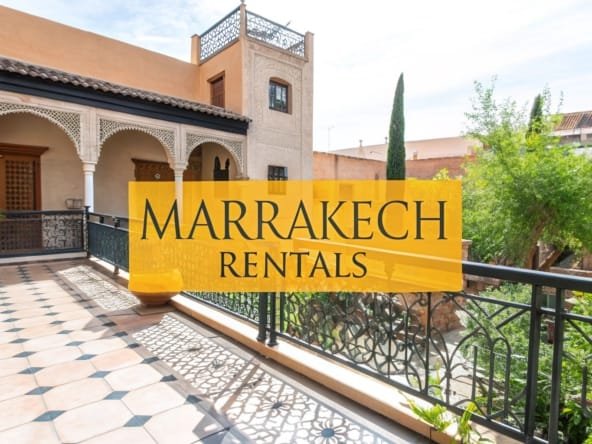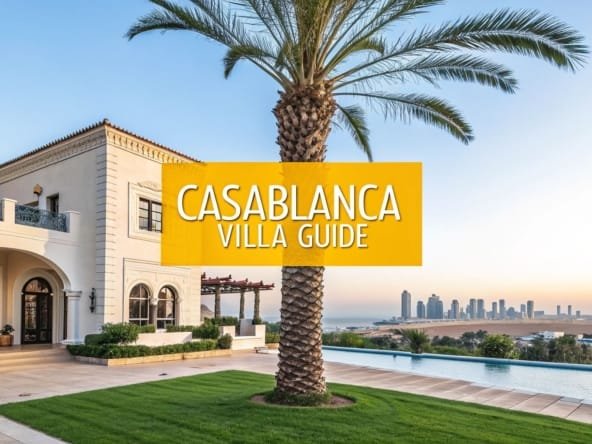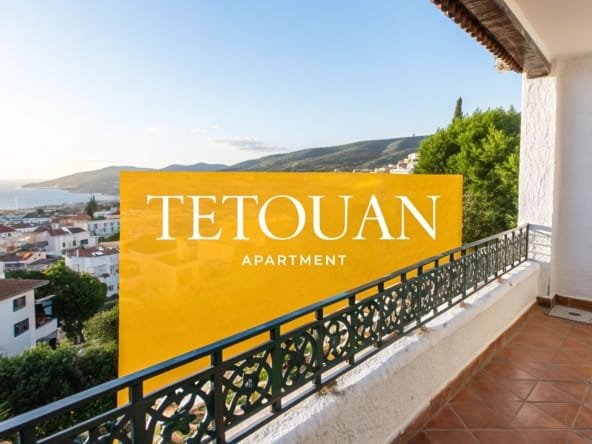When you're ready to find an "appartement a vendre autour de moi," your search really begins online, specifically on platforms built for the Moroccan market. The most reliable starting point is to dive into local real estate portals. Forget generic international sites; you need the ones that agents and sellers here actually use.
Two names will come up again and again: Mubawab and Sarouty.ma. Think of these as your digital command centre, where thousands of listings from across the country are gathered in one place.
How to Start Your Apartment Search in Morocco
Finding the right apartment for sale in your area can feel like a huge task, especially with how quickly things move in Morocco's property market. The trick is to shift from just browsing to actively hunting. This first phase is all about getting comfortable with the right digital tools and understanding the local landscape from day one.
Your best advantage is online. These Moroccan real estate websites are more than just lists of properties; they’re powerful tools designed to help you cut through the clutter and zero in on apartments that truly fit what you're looking for.
Mastering Digital Search Tools
Before you do anything else, go and create accounts on the main portals. This isn't just for convenience; it's a strategic move. It lets you save your favourite searches and, crucially, set up email alerts. An alert for an "appartement a vendre" in your preferred neighbourhood in Casablanca or Rabat means you'll be one of the first to see a new property the moment it's listed.
A smart search is more than just typing in a city. You need to get specific with the filters to make them work for you.
- Price Range: Be honest about your budget. Set a clear minimum and maximum to stop your feed from being clogged with places you can't afford.
- Number of Bedrooms: Filter by the exact number of rooms (chambres) you need for your family or lifestyle.
- Surface Area: Don't forget to specify the minimum square metres (m²) you're willing to accept.
- Property Features: Look for the little things that matter to you, whether it's a balcony, a terrasse (terrace), private parking, or how close it is to the nearest tram stop.
A bit of local knowledge goes a long way. You'll see terms like "salon marocain," "cuisine équipée" (equipped kitchen), or "résidence fermée" (gated community) pop up in listings. Getting to know what these mean will help you read between the lines and spot the best opportunities much faster. This initial groundwork changes your search from a passive scroll into a focused plan.
Getting the Most Out of Local Real Estate Platforms
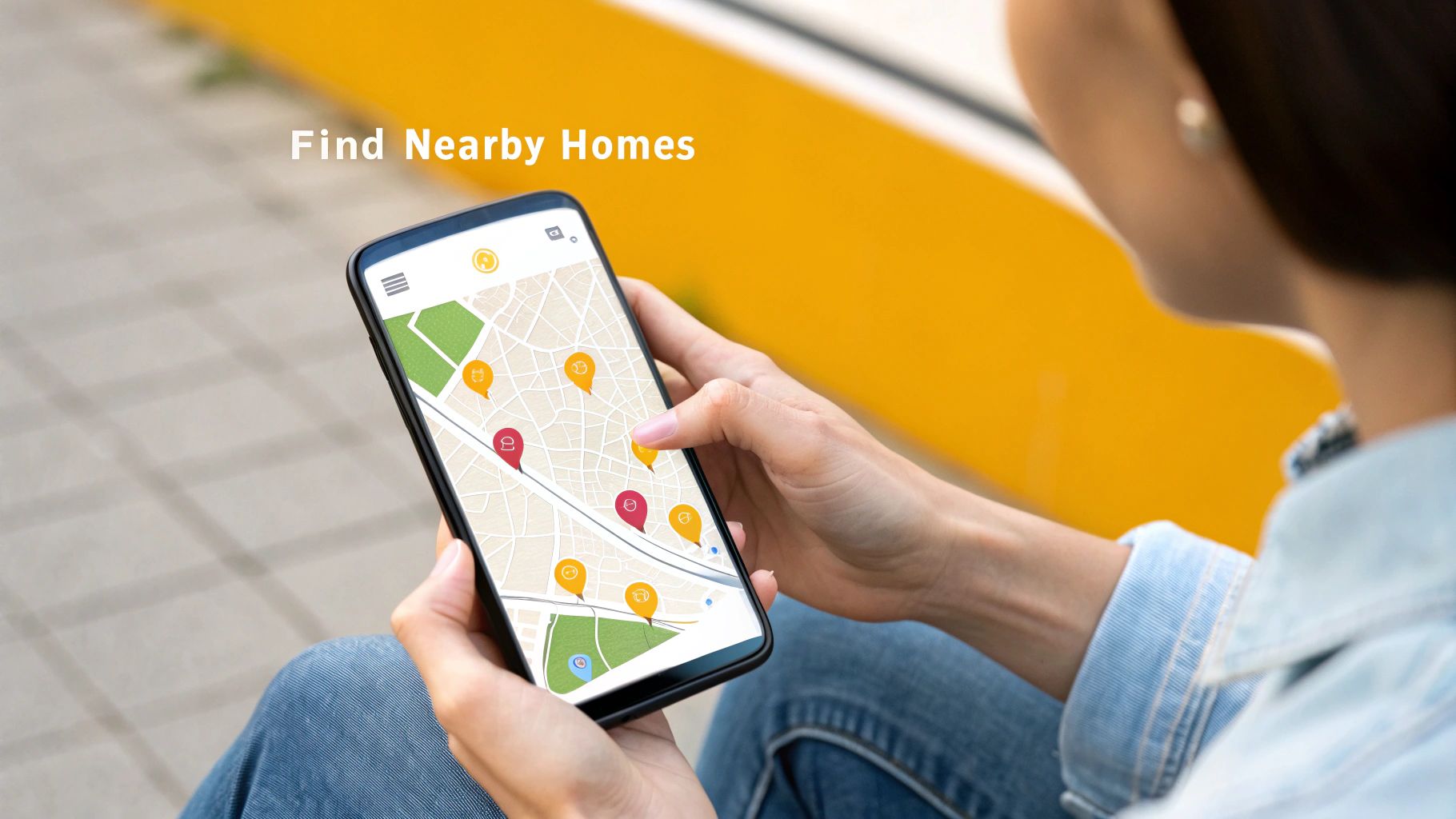
It’s one thing to casually scroll through property listings, but it's another thing entirely to use these platforms like a pro. If you’re serious about finding the perfect "appartement à vendre autour de moi," you need to switch gears from being a passive browser to an active analyst. That means digging deeper than the flashy photos and catchy headlines to figure out what a property is really worth.
Your secret weapon here is the price per square metre (prix par m²). It’s the great equaliser. Let's say you're looking in Casablanca's Maârif neighbourhood and find two apartments that seem identical in size. If one is listed for 15% more than the other, the prix par m² will tell you the real story. Is that higher price backed by superior finishes and a better layout, or is it just wishful thinking on the seller's part? This simple calculation is invaluable for comparing apples to apples, especially when you're weighing options in similar districts like Agdal and Hay Riad in Rabat.
Before you even think about picking up the phone, it’s worth taking a moment to compare the main real estate platforms you'll be using. Each has its own strengths, and knowing which one to focus on can save you a lot of time.
Key Moroccan Real Estate Platforms at a Glance
| Platform | Best For | Key Feature | Average Listings in Major Cities |
|---|---|---|---|
| Mubawab.ma | Comprehensive market overview, serious sellers. | High volume of listings from both agencies and private sellers, often with detailed information. | ~50,000+ |
| Avito.ma | Finding direct-from-owner deals and unique properties. | Morocco's largest classifieds site; huge variety but requires more vetting. | ~70,000+ |
| Sarouty.ma | Premium properties and new developments. | Focuses on higher-end market segments and new builds, often with quality visuals. | ~25,000+ |
| Agenz.ma | Data-driven buyers who want price estimates. | Provides AI-powered property valuations to help gauge fair market value. | ~30,000+ |
This table gives you a quick snapshot, but your best bet is to use a combination of them to get a full picture of what's available.
How to Read Between the Lines of a Listing
Once you're on these sites, remember that the details—or lack thereof—tell a story. A listing with a vague, one-line description is often a red flag. Professionals who are serious about selling provide clear, specific information about the apartment's condition, amenities, and legal standing.
You can learn a lot just by looking closely at the visual evidence:
- Photo Quality: Crisp, well-lit photos? That’s a good sign. Dark, blurry shots, or worse, no photos of the kitchen or bathroom, should make you suspicious.
- Clutter vs. Character: Try to look past the current owner's furniture and décor. What you’re really assessing is the raw space, the amount of natural light, and the condition of the floors, walls, and fixtures.
- The Bigger Picture: Does the listing include photos of the building’s exterior or the common areas (parties communes)? The state of the lobby, stairs, or courtyard says a lot about the building's overall management.
A well-crafted listing is more than just good marketing; it’s a sign of a transparent and serious seller. If they haven’t put effort into the online presentation, you have to wonder what else they might have neglected.
When you find a place that looks promising, your first contact with the agent is your chance to screen it properly. Don't just jump to scheduling a visit. A serious buyer asks smart questions first.
Try asking something specific, like whether the syndic (building management) fees are paid up to date, or if any major building-wide renovations are on the horizon. The agent's response will quickly tell you whether the property is worth your time. This simple step helps you filter out duds early on, saves you countless wasted trips, and immediately shows the agent you mean business.
Evaluating Neighbourhoods for Long-Term Value
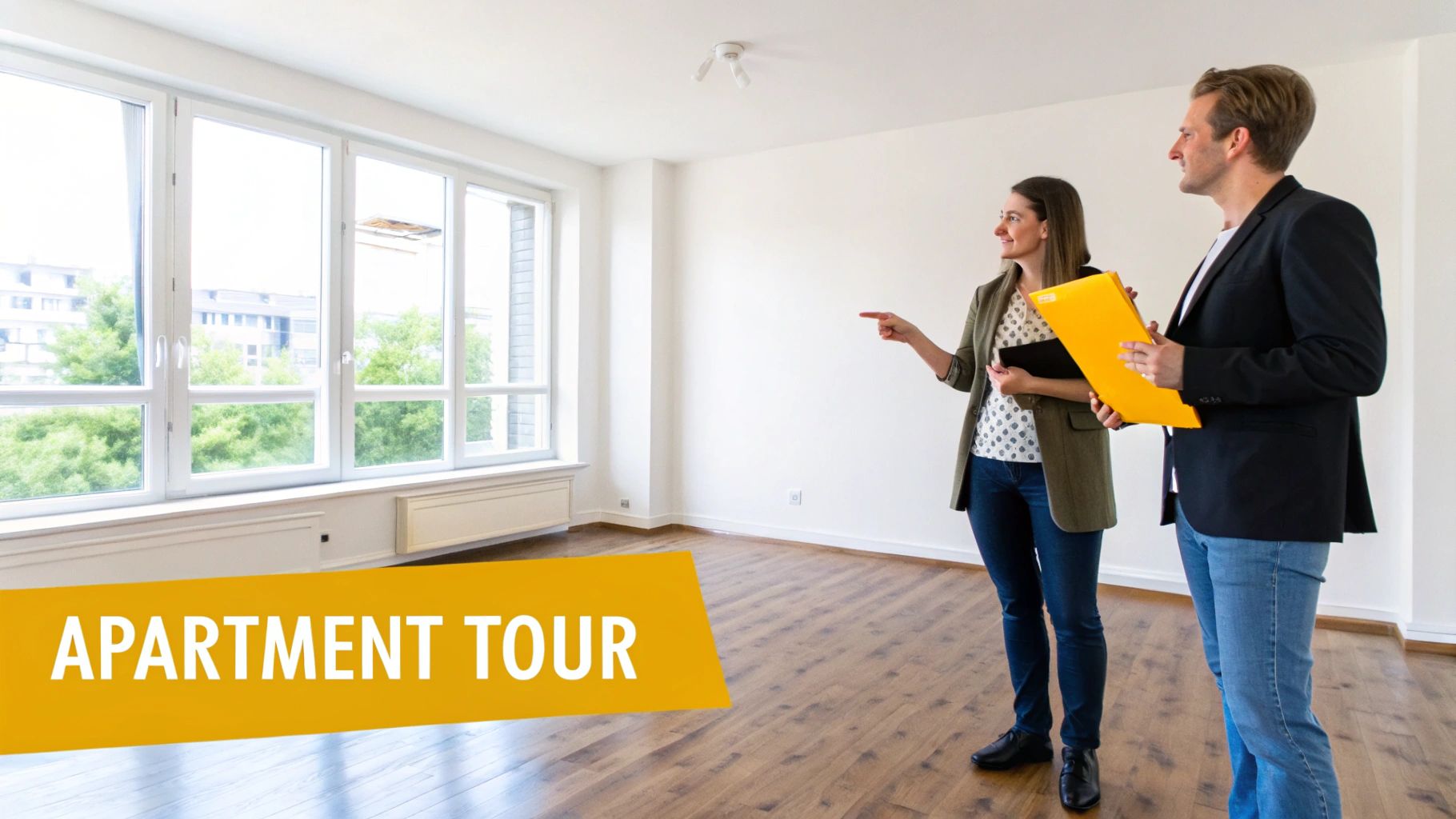
When you're searching for an "appartement a vendre autour de moi," it's easy to get caught up in the details of the apartment itself. But experienced buyers know the golden rule: location is everything. The quartier (neighbourhood) you choose will define your daily life and, just as importantly, the long-term health of your investment.
A beautiful flat in a poorly chosen district can become a regret. The real value isn't just within the four walls of your property; it’s in the streets, the community, and the future of the area surrounding it. You need to think like an investor, looking not just at what the neighbourhood is today, but what it's likely to become in 5 to 10 years.
Analysing a Quartier's Potential
So, how do you spot a neighbourhood with strong growth potential? It comes down to looking at the fundamentals that make an area genuinely desirable to live in. These practical elements are what drive demand and, in turn, property values.
I always advise clients to start with a checklist of non-negotiables:
- Essential Proximity: How far is the walk to local markets (souks), decent schools, and reliable healthcare? Day-to-day convenience is a massive selling point.
- Transport Links: Check for easy access to tram lines, bus routes, and major roads. A well-connected apartment is always in demand, making it easier to rent out or sell later on.
- Urban Development: Keep an eye out for signs of investment. Are new parks, shopping centres, or public transport lines planned? This is often a clear signal that the area is on an upward trajectory.
This kind of analysis turns a simple home purchase into a smart financial move. Think about how this plays out in other markets. In Marseille, for example, the investment potential varies wildly between districts. An affordable area like La Blancarde might offer flats for around €2,300 per square metre with great rental returns, while a developing area like Saint-Loup fetches higher prices precisely because of ongoing improvements and future plans. You can see this dynamic explored further on Investropa.com.
Matching Lifestyle with Location
Of course, an investment is only good if it also works for your life. The best neighbourhood is ultimately the one that feels like home.
A young professional, for instance, might thrive in the buzzing atmosphere of Gueliz in Marrakech, with its modern cafes and boutiques right on the doorstep. A growing family, on the other hand, would likely prioritise quieter, more residential districts with access to parks and safe places for children to play.
The sweet spot is where your personal lifestyle needs meet solid investment potential. You shouldn't have to sacrifice one for the other.
Doing your homework on specific areas is the only way to find this balance. To get started, take a look at our guide on the top neighbourhoods to buy your perfect home in Marrakech. It’s this deep-dive research that ensures the apartment you buy will support both your happiness and your financial future.
The Art of Inspecting a Potential Apartment
An online listing only ever tells you half the story—the part the seller wants you to see. The real truth behind any promising "appartement a vendre autour de moi" only comes out during the property visit, or la visite as it's known here. This is your moment to look past the strategically placed furniture and fresh coat of paint to find out what you’re really buying. A meticulous inspection isn't just a good idea; it's absolutely essential.
The second you walk through the door, switch on your detective mode. Your first priority is checking the apartment's basic health. Be on the lookout for subtle but telling signs of trouble. Are there faint water stains on the ceilings or near window sills? That could be a sign of humidité (dampness), a common and frustrating issue. Get up close to the walls and look for hairline cracks, especially around door and window frames. Don't forget the small details, either—are the floor tiles perfectly level? Do the doors hang straight and close without a struggle?
Looking Beyond the Four Walls
Remember, you're not just buying the space inside the apartment. You're buying into the entire building and its surroundings, which will shape your daily life just as much as the layout of your kitchen.
During your visit, make it a point to dig a little deeper:
- Follow the Sun: If you can, try to see the apartment at different times of the day. How the natural light fills (or doesn't fill) the space dramatically affects the atmosphere and, believe it or not, your future electricity bills.
- Listen Carefully: Pause and just listen. Can you hear the neighbours' television? Is there constant traffic noise from the street below? A place that seems peaceful on a Tuesday morning could be a whole different story on a Friday night.
- Check the Common Areas: The state of the parties communes—the lobby, stairs, lift, and hallways—speaks volumes about the building's management. A neglected entrance is a major red flag.
You're not just purchasing a set of rooms; you're investing in a piece of the entire building. The quality of the management and the upkeep of shared spaces will have a direct impact on your happiness and the property's future value.
Asking the Right Questions
The conversation you have with the agent or owner is just as important as the physical inspection. Come prepared with a list of questions that get to the heart of the matter. Don't be shy about asking about the age of the plumbing and electrical systems, or when the last major renovations took place. Crucially, ask about the monthly syndic (building management) fees.
Understanding the local market also gives you a huge advantage. For example, the Marseille apartment market has been climbing steadily, with prices up by 4.2% year-over-year in early 2025. Knowing this kind of detail gives your questions more weight and helps you judge whether the asking price is truly in line with the apartment's condition and the current market. You can find more Marseille price forecasts on Investropa.com to arm yourself with the right data before you even step inside.
Making an Offer and Navigating the Purchase Process
You've found it. The perfect apartment. After all that searching for an "appartement a vendre autour de moi," the real work is about to begin. Now, the goal shifts from finding the property to making it yours, and that starts with a smart offer.
This isn't the time for guesswork. Your offer should be a confident, well-reasoned figure. Lean on the research you've done on the local prix par m², factor in the apartment's condition, and consider any standout features that add value. A strategic offer tells the seller you're not just interested—you're a serious buyer who has done their homework.
Understanding the Legal Framework
Once the seller accepts your offer, you'll enter the formal Moroccan legal process. Don't worry, you won't be navigating this alone. The entire transaction is overseen by a state-appointed notary, or notaire, who serves as an impartial third party to protect both you and the seller.
The first official step is signing a preliminary promise of sale, called the 'compromis de vente'. This is a critical, legally binding contract that lays out every detail of the sale—the agreed price, property specifications, and any special conditions. You'll typically pay a deposit when you sign this document.
The 'compromis de vente' is the point of commitment. Once it's signed, the property is taken off the market, and backing out can lead to financial penalties. Think of it as the moment your purchase becomes official, locking in the terms while you sort out the final details.
For many buyers, securing financing is a key part of this stage. The process often follows a clear path, as illustrated below.
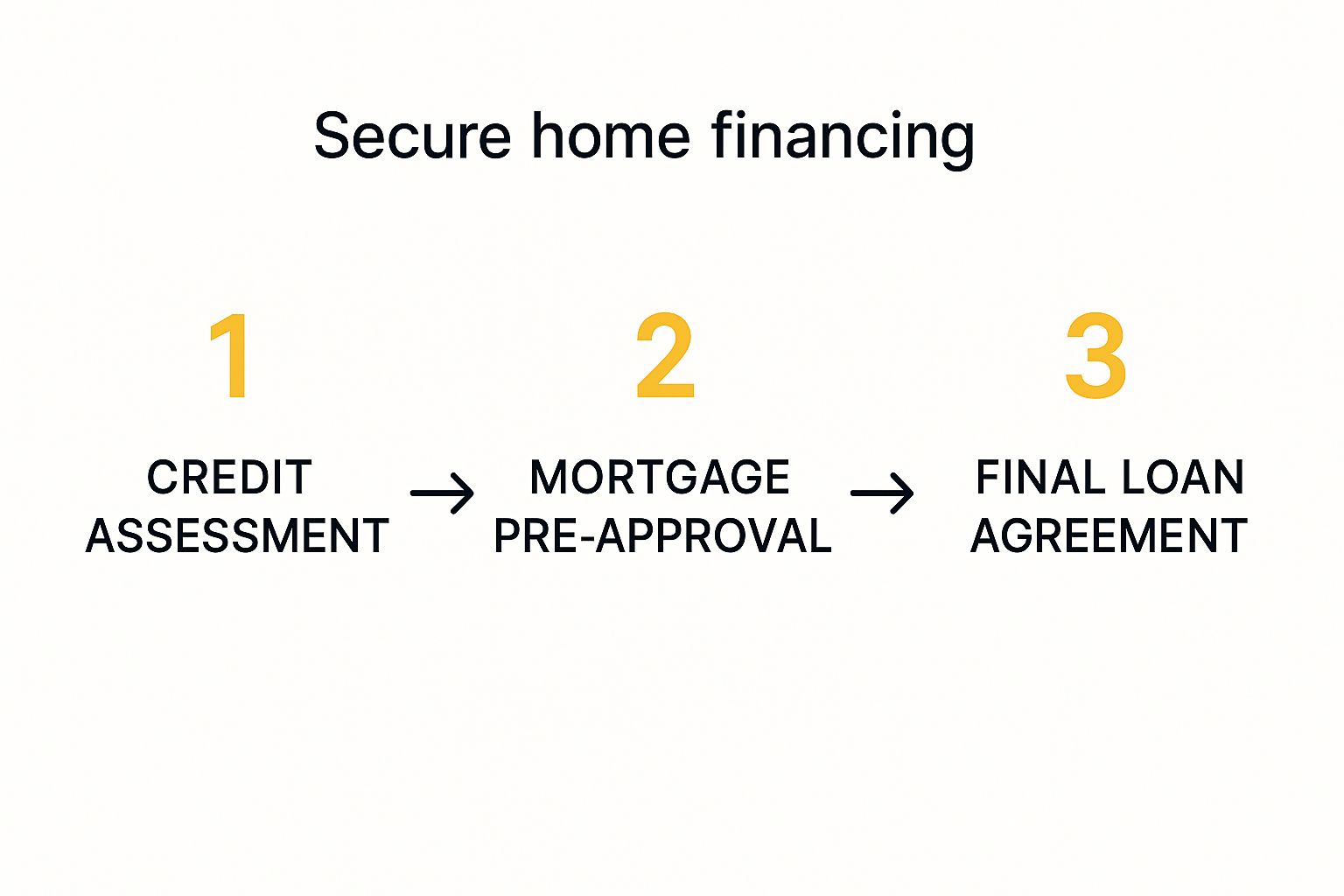
As you can see, getting pre-approved for your mortgage ahead of time can make the entire transaction much smoother and less stressful.
With the 'compromis de vente' signed, your notaire gets to work on the due diligence. They will meticulously verify the property's title deed (certificat de propriété) and check for any liens, outstanding debts, or legal disputes.
The final milestone is signing the 'acte de vente', or the final deed of sale, in the notary's office. This is the moment the property officially becomes yours. For a complete walkthrough of every stage, our guide on how to buy property in Morocco easily breaks it all down. Knowing what to expect makes the entire experience feel much more manageable.
Frequently Asked Questions About Buying an Apartment
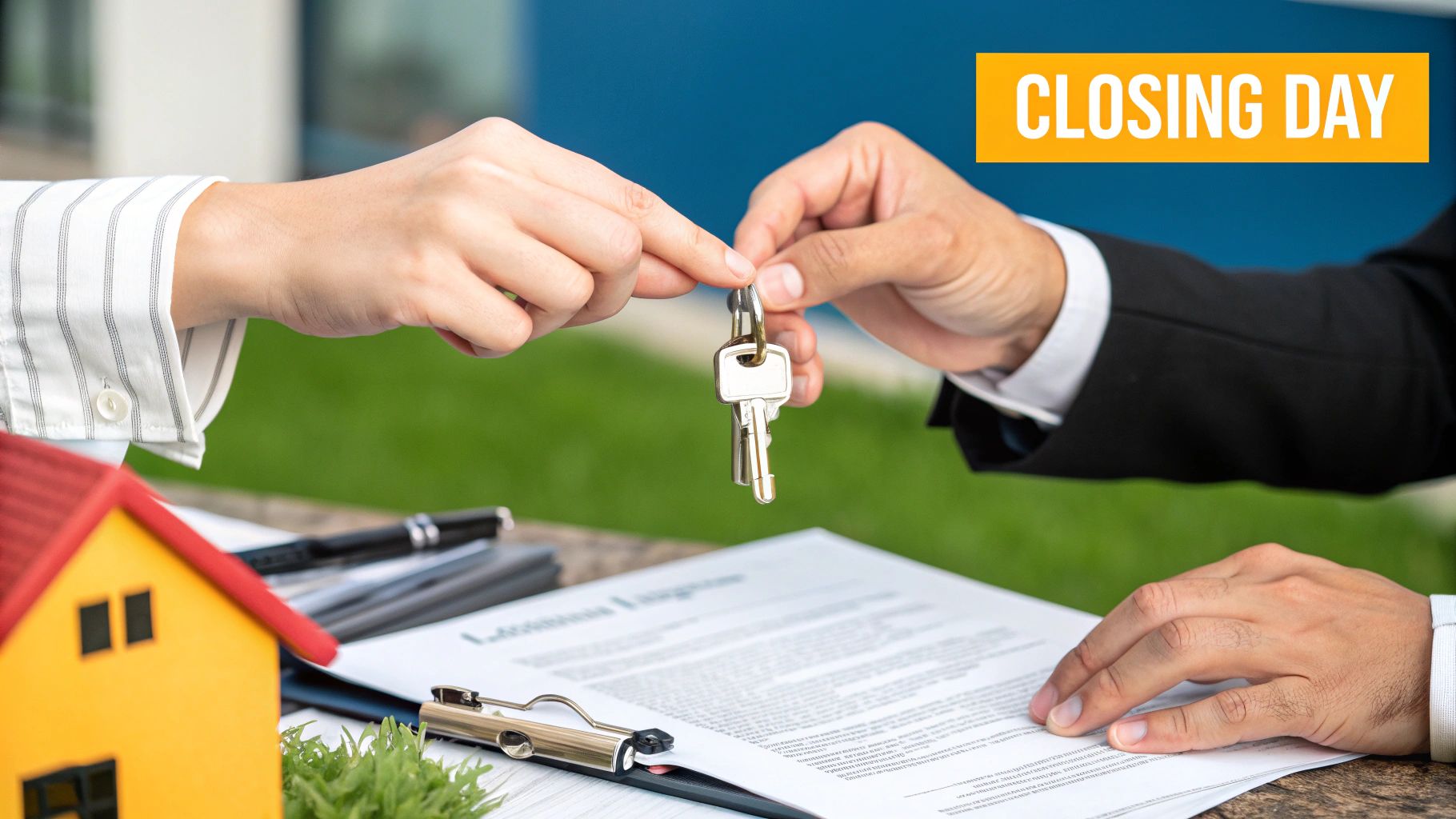
It's completely normal to have questions when navigating the Moroccan property market. Getting clear answers is the best way to feel confident as you search for that perfect "appartement a vendre autour de moi".
One of the first things people ask about are the hidden costs. It's smart to look beyond the sticker price. In Morocco, you need to budget for notary fees, land registry fees (known as conservation foncière), and registration taxes. All told, these extra expenses usually add up to about 6-7% of the property’s value.
Understanding Foreign Ownership and the Notary's Role
A big question for international clients is whether they can legally buy property here. The answer is a clear and simple yes. Foreigners can purchase titled apartments (titré) in Morocco with no restrictions, following the very same process as any Moroccan citizen.
Another area that often needs clarification is the role of the notary, or notaire. Their involvement in any property sale isn't just a suggestion; it's mandatory.
Think of the notary as more than just a lawyer. They are a state-appointed, neutral official responsible for the integrity of the entire transaction. They verify the title deed, draft the official contracts, handle the secure transfer of funds, and ensure the sale is properly registered. This oversight is a fundamental protection for both the buyer and the seller.
These are just a couple of the common questions we hear all the time. For a much more in-depth look at what buyers need to know, feel free to explore our full frequently asked questions page.
Ready to take the next step in your property journey? Rich Lion Properties is here to provide the expert guidance you need. Visit us online to explore listings and connect with our team today.

